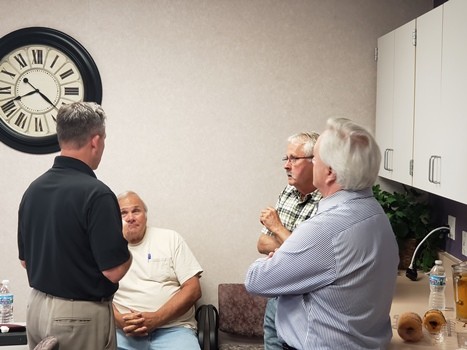Dennis Egan, the CEO and President of Epitome Energy, met with the Crookston Housing and Economic Development (CHEDA) advisory committee on Tuesday morning. Egan said there would be some “huge” announcements coming on September 5th when Commissioner Thom Peterson from the Department of Agriculture visits Crookston along with Egan and the Epitome Energy team.
Egan expressed it was good news to the start the day with the Crookston City Council voting to provide $150,000 of the $250,000 Epitome Energy had requested from CHEDA to begin the permitting and testing process. “Absolutely, just what that means from a community for welcoming Epitome Energy and then for us to leverage a part of a grant we got from the Department of Ag,” said Egan. “That spins out all kinds of other things so that on September 5 for us to be able to make a huge announcement along with the Commissioner of Ag is going to be a welcome development for the community and the project. We’re excited to have the commissioner come up and share all of the news with those that are interested in Epitome Energy and what we’re doing. It’s significant news that we’re going to be able to announce on the fifth in terms of how this project will move forward and what the time looks like. Our next big milestone will be announced.”
CHEDA Executive Director Craig Hoiseth said it showed solidarity between the council and the CHEDA board that they voted to provide the initial $150,000 of the loan request. “Two weeks ago the advisory committee recommended we provide $250,000 to get this air permitting underway,” said Hoiseth. “Last night the Mayor and all the councilmen during the Ways & Means Committee meeting voted affirmatively to provide $150,000 of that $250,000 to show solidarity in the commitment from the city and from CHEDA. All that will come together and we’ll create a business subsidy agreement with Epitome and get this off hopefully next week at a CHEDA board meeting.”
Egan also told the board they are currently working on their due diligence to expand the initial crush facility concept from 21-million bushels to 42-millions bushels. He added he hopes he’ll also have more on what that would look like, including next steps. “There is a lot of due diligence that we still need to do on that front and I hope on the fifth that we’ll be able to talk more about what that would look like and next steps,” said Egan. “But we need to explore all options and figure out what the financials look like and what that means from a market standpoint. When you crush a bean you get two products, an oil and meal. On the meal side, we have to find a home for that. Most of that goes into the livestock industry. We’re exploring what that could mean from a fish market with a lot of facilities on the west coast now farming salmon and other kinds of fish using soy meal as fish food. So, we’re looking at all different kinds of options to try to figure it out. Of course, the closest one to us is the 3.5 million hogs grown in Canada.”
The extra oil produced that goes into making biodiesel would not be as difficult to sell until the biodiesel plant is complete after which all the oil would be used in the plant. “Our plan is currently that the 30 million gallons (of oil) will go into the biodiesel facility,” said Egan. “There is going to be a gap for a year or two because we’re going to build the large crush plant and then the biodiesel plant. When we’re not selling it into our biodiesel plant it will go to the open market. We’ve had a number of different businesses come to us saying they’ll take it. So, getting rid of the oil is not the issue at all. And as we’ve shared in the past we’ve got a letter of intent for somebody who has already said they’ll purchase the 30 million gallons of biodiesel. That’s one thing we can check off our list.”
Craig Buness asked whether Egan’s goal was a new market to replace the losses from the Chinese Market. Egan said yes, adding that it would also positively affect the crop value differential for soybeans in northwest Minnesota. “The reason we chose Crookston and Northwest Minnesota for a crushing facility was to create a market,” said Egan. “We have seen for years that the basis which is the differential from what you pay in northern Minnesota to Chicago or southern Minnesota has been anywhere from $0.90 to a $1.10 difference. The grower in northern Minnesota is getting a $1.10 less than someone in southern Minnesota. We think that by creating a market with the crush facility we’re going to be able to have an improvement of $0.20 as the study from the University of Minnesota showed. Then you see the China issue, driven in part with tariffs but also because about 60 percent of the Chinese hog market has died from a disease so there is no market there. Some have said it will come back but that could be five years down the road or longer.”
Egan also said that elevators in this area are expecting the differential to grow this fall to $1.50-1.70. “What we’re seeing is that some elevators in this market are saying instead of $1.10 difference it could be a $1.50, a $1.70,” said Egan. “So, the beans here are going to be really cheap. There is some speculation that some of the big players will buy cheap and rail or truck them down to southern Minnesota or Nebraska and crush them there. We are saying why do we want to lose the value in the local market and so we think that by having our facility here it’s going to benefit everybody.”
Egan also expressed his belief that support at the state legislature has been non-partisan with legislatures in both parties from across the state carrying legislation to support the facility which he hopes will continue with the bonding request that could be between $7-9 million dollars from the City of Crookston. “I think people at the state legislature realize it,” said Egan. “So, the City of Crookston is going to request from our two local legislatures to carry a bonding bill for infrastructure. That would allow the City of Crookston to move forward with putting some roads in, sewer, water, electric and all the utilities to the site. The goal is to create that 100 acres so that in the future other companies can come in and build. When we get that biodiesel facility up in running one of the byproducts is glycerin. Right here in Crookston at AURI (Agricultural Utilization Research Institute), they are developing the technology to take glycerin and make a single cell protein out of it. We have said to that group of folks working on that – let’s build a facility next to the biodiesel plant, take our glycerin, make the single-cell protein, and ship it west. There are things like that in the works with the conversations we are having. So, all of that infrastructure will be put in with the bonding dollars.”
Egan concluded that the community was invited to the announcements on September 5 and that he, Commissioner Peterson, and Egan’s team with Epitome Energy would be available answer specific questions on the project. “I would just say again that everybody is welcome if you want to hear more about Epitome Energy and from the Commissioner of Ag we’re going to have some announcements September 5th in the middle of the afternoon at the CHEDA facility,” said Egan. “We’re going to have my team here in one place so people can ask specific questions.”




